CBD may have anticoagulant effects that could thin the blood. Research suggests it can interact with medication like blood thinners.
Exploring the impact of CBD on blood consistency, it’s essential to understand that current evidence is emerging and not conclusive. Cannabidiol, or CBD, is a popular natural remedy extracted from the cannabis plant, widely used for various medicinal purposes. Many consumers turn to CBD oil for its potential to alleviate pain, reduce anxiety, and improve sleep.
As its use gains traction, questions about side effects and interactions with other medications arise. One of the critical inquiries is its effect on blood thinning. While some studies indicate a possible interaction with blood-thinning medications, leading to increased anticoagulation, comprehensive clinical trials are necessary to fully understand CBD’s influence on hematology and its safety profile for individuals with bleeding disorders or on anticoagulant therapy. Users considering CBD for therapeutic purposes should consult healthcare professionals, especially when taking other medications.
The Surge Of Cbd Popularity
The recent upsurge in CBD popularity can be traced back to its therapeutic potentials and wide array of perceived health benefits. The interest in CBD, or cannabidiol, began to grow significantly after early studies suggested its use in treating various conditions without the ‘high’ associated with cannabis.
Current trends in CBD usage reflect a shift towards natural remedies. Many people now incorporate CBD into their daily routines. From oils and tinctures to topical creams and edibles, the market has seen an influx of CBD-infused products. This surge is propelled by consumer experiences and anecdotal evidences suggesting CBD’s effectiveness in managing pain, anxiety, and sleep disorders.

Credit: www.mdpi.com
Cbd Basics
CBD stands for cannabidiol, a compound found in hemp plants. It is not psychoactive, which means it does not make you high. This is a key point. People often confuse CBD with THC. THC is another compound in cannabis plants. Unlike CBD, THC causes mind-altering effects.
| CBD | THC |
|---|---|
| Non-psychoactive | Psychoactive |
| Found in hemp plants | Found in various cannabis strains |
| Legal in many places | Laws vary greatly |
Claims And Concerns
Many believe that CBD can thin the blood, similar to the effect of aspirin. This belief has sparked both interest and caution among users. Safety is a top concern with any supplement, including CBD. Critics often argue that there’s not enough research to support the blood-thinning effects of CBD.
Users should consider potential interactions with other medications. Particularly if they are taking blood thinners. Consulting with a healthcare provider is essential. This ensures that CBD use is both safe and effective for individual health needs. Misunderstandings arise due to the lack of widespread knowledge. It is crucial to differentiate between anecdotal evidence and scientifically-verified facts.
| Assertion | Fact Check |
|---|---|
| CBD acts as a blood thinner | Research is ongoing |
| Can replace blood-thinning meds | Consult healthcare provider first |
| Safe for everyone to use | Not confirmed, more research needed |

Credit: www.frontiersin.org
Cbd And Blood Thinness
CBD may impact how blood clots. Studies show that CBD can interact with the body’s endocannabinoid system. This system helps balance many functions.
One important function is maintaining blood consistency. CBD might change this by affecting enzymes. The cytochrome P450 enzymes are vital for blood thinning drugs. CBD can slow these enzymes down.
This slowdown may increase drug levels in blood. Then, blood may become thinner than usual. People who take warfarin or similar drugs should be careful. Talk with a doctor before mixing CBD and blood thinners.
Consumers also report noticeable effects. Some say CBD helps them feel more relaxed with improved circulation. Yet, personal experiences can differ.
Medical Community Insights
Clinical studies on CBD (cannabidiol) and its effects on blood are scarce. Early research suggests that CBD may influence blood thinning. Yet, these studies are preliminary and limited in scope. Diverse results indicate more data is needed. Conclusive evidence is still out of reach.
Expert opinions vary, with some acknowledging potential for CBD to reduce blood clotting. Such effects could be beneficial for certain conditions. Experts emphasize the importance of controlled clinical trials to verify these claims. They encourage cautious use among patients on blood thinners.
Without robust, repeatable results, the medical community remains hesitant to endorse CBD for blood thinning. Information is evolving, and so doctors advise consulting healthcare providers before starting any CBD regimen.
Safe Use Of Cbd
Consulting healthcare professionals is crucial before starting CBD. Discuss your health conditions and medications with a doctor. They can provide personalized advice and safety tips. The goal is to ensure CBD does not harm you.
Always follow the product’s instructions for use. Start with a low dose and only increase if needed. This controls the effects on your body. Checking the CBD purity and quality is essential. Only buy from trusted sources.

Credit: www.frontiersin.org
Conclusion
Wrapping up, the relationship between CBD and blood viscosity remains a hot topic. Research is ongoing, and evidence is still emerging. As with any supplement, consult a healthcare professional before adding CBD to your regimen, especially if you’re on blood-thinning medications.
Stay informed, stay safe, and watch this space for more updates.
